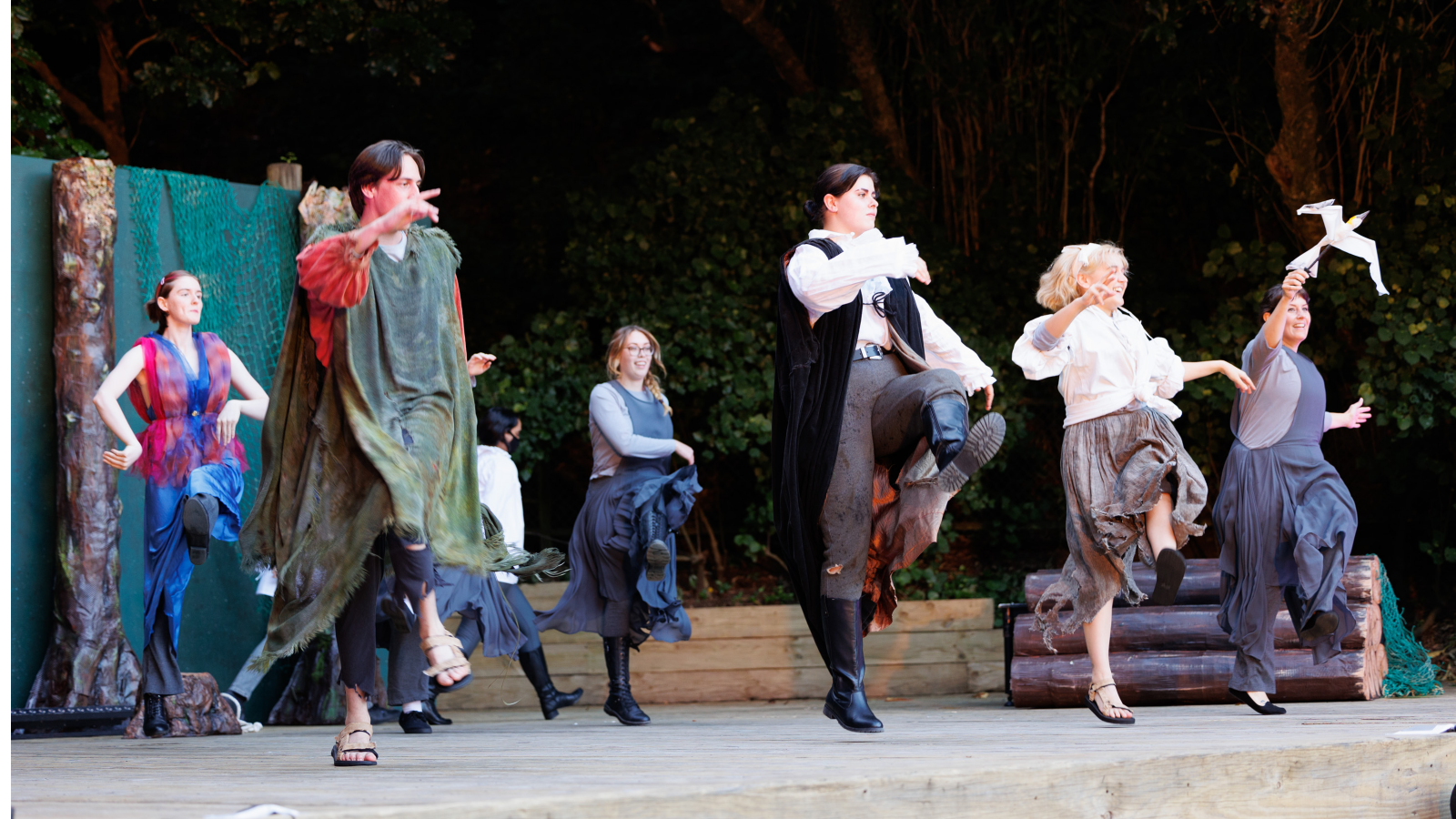
After being selected to direct this year’s production, Dr Evans picked The Tempest for the 2023 season. The Tempest follows Prospero, the former Duke of Milan, who has been usurped by his brother Antonio. When a ship carrying Antonio and other enemies of Prospero passes the island where Prospero has been living in exile (and enslaving the occupants), Prospero uses magic to conjure up a storm (the titular tempest) to shipwreck his enemies on the island and enact his revenge.
“The last couple of productions I have worked on have had a strong eco-focus,” Dr Evans says. “I wanted to find a play in Shakespeare’s canon where I could explore these themes, and the Tempest seemed to suit that focus.”
Dr Evans emphasised several different aspects of the play to bring out this eco-focus and explore environmental themes. One of those elements was having the spirits of the island appear in every scene, moving across and around the stage.
“I wanted to emphasise the idea that the natural systems of the world have a right to be present and to exist without us having to exert power over them and without having to be productive,” Dr Evans says.
“The performance itself is taking place in the Dell at the Wellington Botanic Garden, so my hope is that people noticing and thinking about the spirits on stage will translate to them thinking about the natural environment of the gardens they are in as they watch the play.”
Another element of the play that Dr Evans wanted to emphasise was Shakespeare’s references to deforestation and logging in the play. The set is comprised of tree stumps, and characters are often seen interacting with and carrying logs.
“As well as the environmental impacts of logging, the constant presence of logging also links in with the themes of colonisation in the play,” Dr Evans says. “Some scholars have theorised that audiences in Shakespeare’s time would have recognised the logging activity as related to colonisation—logging to build settlements and support ongoing daily activity—rather than an emphasis on the need for wood to build and repair ships for a return journey.”
This combination of colonial power and environmental destruction has been emphasised through the power Prospero wields to enslave the inhabitants of the island and create the storm to shipwreck his enemies. Dr Evans and her team emphasised several moments in the play to challenge Prospero’s use of power and to show a shift in that power back to the island and its inhabitants.
These concerns with environmental destruction have had a tragic reflection in the real world, with Cyclone Gabrielle hitting Aotearoa during the first week of the play.
“It certainly seemed very timely, with a severe weather event driven by climate breakdown hitting our country—just as we were discussing the consequences of environmental destruction through our play.”
The production itself has been designed to be as eco-friendly as possible. It uses modern LED lighting, which has a much lower impact on the environment than traditional theatre lighting, and the production team have used almost all second-hand costumes for the production through collaboration with Toi Whakaari staff and recent graduates. The costumier, Sarah Bell, was careful to pick fabrics that can be washed instead of dry-cleaned, which is much worse for the environment. Set designer Megan Gladding also worked carefully to ensure as much of the set as possible can be reused for future productions.
Another important aspect of the production for Dr Evans was making the rehearsal process as collaborative as possible for the actors.
One of the ways in which Dr Evans achieved this was in double-casting leading roles. Although this had a practical element, allowing rehearsals and performances to proceed even if actors were ill or isolating due to COVID-19, it also allowed both actors cast in a role to work closely together to craft each role as a team, each developing their own individual characterisation while supporting the other actor in their creative development. In addition, several supporting actors have stepped in to cover other roles, giving ensemble members a chance to explore more of the play. Shakespeare’s Prospero has three times more lines than anyone else in the play, often speaking for other characters about their own experiences. To bring a stronger sense of balance and collaboration, the team found many opportunities to adapt his lines and allow other characters to speak for themselves.
The Tempest is one of Shakespeare’s most musical plays. Another highlight of the production came through providing an internship placement for an MFA (Creative Practice) student in music who composed dynamic songs for the spirit Ariel. Another student from the University’s Summer Research Scholarship programme served as sound engineer and composed music for the ‘masque’, the play-within-a-play, performed to celebrate the betrothal of Prospero’s daughter Miranda to the queen’s son.
The Tempest is showing at the Wellington Botanic Garden until Sunday 26 February 2023.
Anyone who purchased tickets to the shows cancelled as a result of Cyclone Gabrielle can either attend a show this week, receive a refund, or donate the cost of their ticket.
